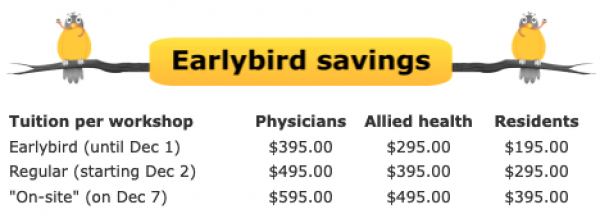Satellite Event: CBT Canada
Happy Science: Evidence-based guidance for the universal human quest
December 7 | 9:00AM-12:30PM | 9.0 Mainpro+ | $395 tuition
Greg Dubord, MD is the leading advocate of medical CBT—the integration of cognitive behavior therapy’s tested techniques into normal family practice appointments.
Dr. Dubord is the CPD Director of CBT Canada and the Director of the Fellowship in Medical CBT (FMCBT). Under Dr. Dubord’s leadership, CBT Canada won the National CME Program Award of the College of Family Physicians of Canada for the Certificate in Medical CBT (CMCBT), and CBT Canada became the first institution authorized by the CFPC to provide three-credits-per-hour CME.
In addition to nearly 25 years of teaching with the University of Toronto’s Department of Psychiatry, Dr. Dubord regularly gives workshops for nine other Canadian medical schools. He has provided medical CBT workshops at every Family Medicine Forum since FMF began in 2000 (usually several per year; now over 50 FMF workshops total). He has led trainings in all ten provinces—along with the Yukon, the Northwest Territories, and Nunavut—and in over a dozen overseas countries. In total, Dr. Dubord has presented over 500 full-day (or longer) workshops on medical CBT.
Dr. Dubord completed his orthodox CBT training under CBT’s founder, Dr. Aaron T. Beck, and was the first Canadian Fellow of the Beck Institute. In the late 1990s the Clarke Institute of Psychiatry (now CAMH) recruited Dr. Dubord to establish the Advanced CBT Institute. He is a recipient of the University of Toronto Department of Psychiatry’s Continuing Mental Health Education Award, and the CME Teacher of the Year award from the University of Toronto’s Faculty of Medicine.
When he’s not training physicians in medical CBT, Greg’s passions include mountain biking and alpine skiing—but most importantly, being the best husband and dad he can be.

SpicyPsychUpdates: The Cayenne Collection
December 7 | 1:00PM-4:30PM | 9.0 Mainpro+ | $395 tuition
Greg Dubord, MD is the leading advocate of medical CBT—the integration of cognitive behavior therapy’s tested techniques into normal family practice appointments.
Dr. Dubord is the CPD Director of CBT Canada and the Director of the Fellowship in Medical CBT (FMCBT). Under Dr. Dubord’s leadership, CBT Canada won the National CME Program Award of the College of Family Physicians of Canada for the Certificate in Medical CBT (CMCBT), and CBT Canada became the first institution authorized by the CFPC to provide three-credits-per-hour CME.
In addition to nearly 25 years of teaching with the University of Toronto’s Department of Psychiatry, Dr. Dubord regularly gives workshops for nine other Canadian medical schools. He has provided medical CBT workshops at every Family Medicine Forum since FMF began in 2000 (usually several per year; now over 50 FMF workshops total). He has led trainings in all ten provinces—along with the Yukon, the Northwest Territories, and Nunavut—and in over a dozen overseas countries. In total, Dr. Dubord has presented over 500 full-day (or longer) workshops on medical CBT.
Dr. Dubord completed his orthodox CBT training under CBT’s founder, Dr. Aaron T. Beck, and was the first Canadian Fellow of the Beck Institute. In the late 1990s the Clarke Institute of Psychiatry (now CAMH) recruited Dr. Dubord to establish the Advanced CBT Institute. He is a recipient of the University of Toronto Department of Psychiatry’s Continuing Mental Health Education Award, and the CME Teacher of the Year award from the University of Toronto’s Faculty of Medicine.
When he’s not training physicians in medical CBT, Greg’s passions include mountain biking and alpine skiing—but most importantly, being the best husband and dad he can be.

Contact us
This email address is being protected from spambots. You need JavaScript enabled to view it.
Tel: Please email us your telephone number and availability. We will call back.
IS Event Solutions
471 Av. Alexandra, St-Lambert, QC J4R 1Z4
